-
 bitcoin
bitcoin $120167.907534 USD
1.27% -
 ethereum
ethereum $4468.611945 USD
2.53% -
 xrp
xrp $3.013607 USD
1.80% -
 tether
tether $1.000549 USD
-0.01% -
 bnb
bnb $1092.592149 USD
6.28% -
 solana
solana $231.391244 USD
4.59% -
 usd-coin
usd-coin $0.999699 USD
-0.04% -
 dogecoin
dogecoin $0.259020 USD
4.30% -
 tron
tron $0.342747 USD
0.34% -
 cardano
cardano $0.860977 USD
1.07% -
 hyperliquid
hyperliquid $50.155412 USD
5.34% -
 chainlink
chainlink $22.637678 USD
0.46% -
 ethena-usde
ethena-usde $1.000528 USD
-0.07% -
 avalanche
avalanche $30.613779 USD
-0.07% -
 stellar
stellar $0.403905 USD
0.94%
Does the Ethereum ETF support physical redemptions?
Ethereum ETFs provide price exposure to Ether without direct ownership, with redemptions typically settled in cash due to regulatory, operational, and security constraints.
Sep 29, 2025 at 08:54 pm
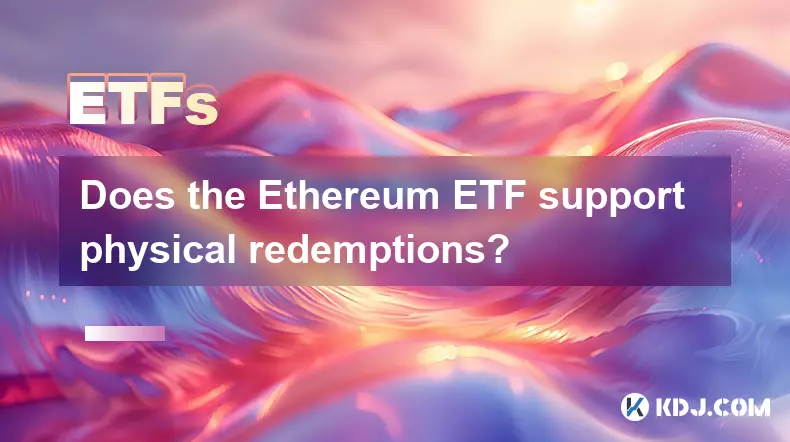
Ethereum ETF Structure and Redemption Mechanism
1. Ethereum exchange-traded funds (ETFs) operate under a framework designed to mirror the price movements of Ether, the native cryptocurrency of the Ethereum blockchain. These financial instruments are structured to provide exposure without requiring investors to directly hold digital assets. The redemption process within these ETFs varies depending on their classification—synthetic or physically backed.
2. Physically backed Ethereum ETFs hold actual Ether in secure custody solutions. In such cases, authorized participants may engage in creation and redemption activities using physical Ether. However, most regulatory jurisdictions require strict compliance with anti-money laundering (AML) and know-your-customer (KYC) protocols before allowing any transfer of underlying assets.
3. Physical redemptions in Ethereum ETFs are generally restricted and not available to retail investors. Instead, redemptions are typically conducted in cash, even for physically backed funds. This approach simplifies logistics and reduces counterparty risk associated with transferring digital tokens across blockchain networks.
4. The infrastructure supporting physical redemptions remains underdeveloped compared to traditional asset classes. Moving large quantities of Ether requires coordination between custodians, fund managers, and blockchain validators. Settlement finality on Ethereum can also introduce timing discrepancies that complicate same-day redemption processes.
5. Regulatory clarity continues to shape how redemption mechanisms are implemented. U.S. Securities and Exchange Commission (SEC) guidelines emphasize investor protection and market stability, which often leads to favoring cash-based settlements over direct crypto transfers.
Differences Between Synthetic and Physical ETF Models
1. Synthetic Ethereum ETFs do not hold actual Ether. Instead, they use derivatives such as swaps to replicate price performance. These models inherently exclude physical redemptions since no underlying asset is held by the fund.
2. Physically backed ETFs purchase and store Ether through regulated custodians. While this model supports the possibility of physical settlement, operational complexity limits its implementation. Custodial arrangements must meet insurance, auditing, and cybersecurity standards enforced by financial authorities.
3. Even in physically backed ETFs, the standard practice is to settle creations and redemptions in cash. This maintains alignment with existing securities market infrastructure and avoids exposing shareholders to blockchain-specific risks like network congestion or smart contract vulnerabilities.
4. Market makers and institutional players benefit from arbitrage opportunities when premiums or discounts emerge between the ETF’s net asset value (NAV) and trading price. Cash redemption mechanisms enable efficient rebalancing without triggering on-chain transactions that could incur gas fees or visibility issues.
5. Jurisdiction plays a critical role in determining permissible structures. European markets have seen more flexibility in crypto-backed ETF designs, while North American regulators remain cautious about enabling direct token withdrawals from investment products.
Institutional Access and Authorized Participants
1. Only authorized participants (APs), typically large financial institutions, can interact directly with ETF issuers to create or redeem shares. These entities manage the logistical demands of handling either cash or physical assets based on the fund's design.
2. For Ethereum ETFs, APs may be required to post collateral in fiat currency or other securities when creating new shares. Redemption requests are fulfilled according to predefined rules outlined in the fund prospectus, which usually specify cash delivery.
3. No major Ethereum ETF currently allows public investors to claim Ether holdings upon redemption. Shareholders sell their positions on secondary markets just like any other stock or ETF, receiving fiat proceeds through their brokerage accounts.
4. Transparency reports issued by ETF providers disclose custodial details, including wallet addresses where Ether is stored. Independent audits verify holdings regularly, reinforcing trust in the physical backing despite the absence of individual withdrawal rights.
5. The distinction between ownership of ETF shares versus direct ownership of Ether remains fundamental. Investors gain economic exposure but relinquish control over private keys and transaction initiation capabilities inherent to self-custody wallets.
Frequently Asked Questions
Can I withdraw Ether directly from an Ethereum ETF?No. Ethereum ETFs do not permit individual investors to withdraw Ether. All transactions occur in fiat currency through brokerage platforms.
Do physically backed Ethereum ETFs actually hold Ether?Yes. These funds purchase and store Ether via licensed custodians. Publicly disclosed wallet addresses allow verification of reserves through blockchain explorers.
Why don’t Ethereum ETFs offer physical redemptions?Operational complexity, regulatory constraints, and security concerns make direct redemptions impractical. Cash settlements align better with established financial systems and reduce systemic risk.
Who can redeem shares of an Ethereum ETF for Ether?Currently, no authorized participant redeems Ethereum ETF shares for physical Ether. Redemptions are settled in cash to maintain consistency with securities regulations and market norms.
Disclaimer:info@kdj.com
The information provided is not trading advice. kdj.com does not assume any responsibility for any investments made based on the information provided in this article. Cryptocurrencies are highly volatile and it is highly recommended that you invest with caution after thorough research!
If you believe that the content used on this website infringes your copyright, please contact us immediately (info@kdj.com) and we will delete it promptly.
- BlockDAG, DOGE, HYPE Sponsorship: Crypto Trends Shaping 2025
- 2025-10-01 00:25:13
- Deutsche Börse and Circle: A StableCoin Adoption Powerhouse in Europe
- 2025-10-01 00:25:13
- BlockDAG's Presale Buzz: Is It the Crypto to Watch in October 2025?
- 2025-10-01 00:30:13
- Bitcoin, Crypto, and IQ: When Genius Meets Digital Gold?
- 2025-10-01 00:30:13
- Stablecoins, American Innovation, and Wallet Tokens: The Next Frontier
- 2025-10-01 00:35:12
- NBU, Coins, and Crypto in Ukraine: A New Yorker's Take
- 2025-10-01 00:45:14
Related knowledge
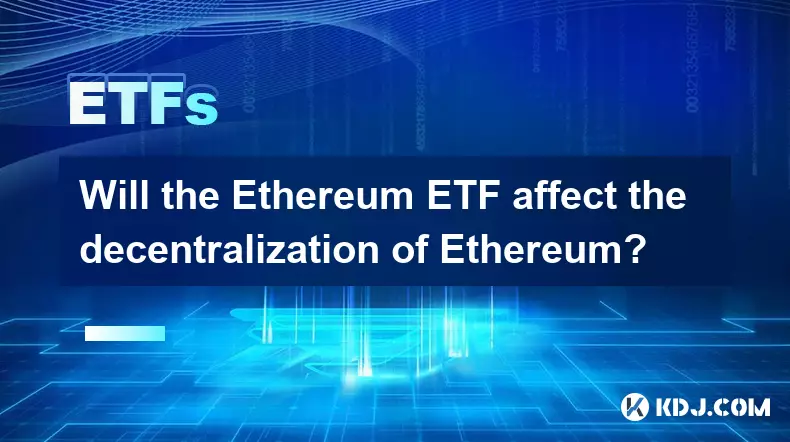
Will the Ethereum ETF affect the decentralization of Ethereum?
Sep 28,2025 at 04:37am
Understanding Ethereum ETFs and Their Structure1. An Ethereum ETF (Exchange-Traded Fund) is a financial product that tracks the price of Ethereum with...
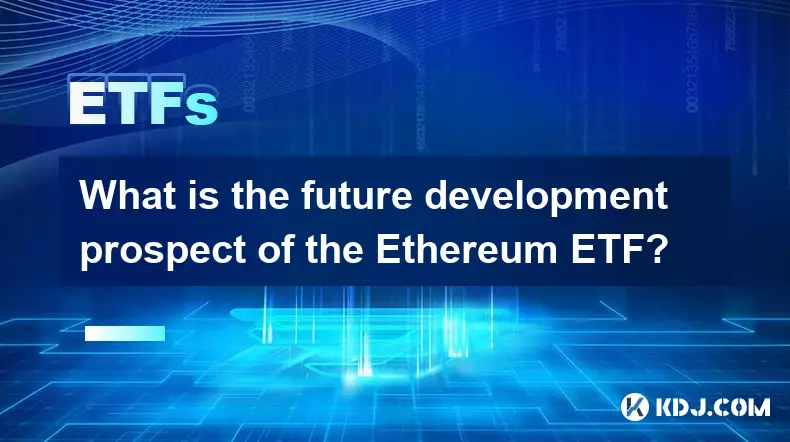
What is the future development prospect of the Ethereum ETF?
Sep 23,2025 at 01:36am
Ethereum ETF and Market Dynamics1. The introduction of an Ethereum ETF has sparked significant interest across the digital asset space. Institutional ...

Is the Ethereum ETF affected by Ethereum gas fees?
Sep 25,2025 at 12:18am
Ethereum ETFs and Their Structural Independence from Gas Fees1. Ethereum Exchange-Traded Funds (ETFs) are financial instruments designed to track the ...
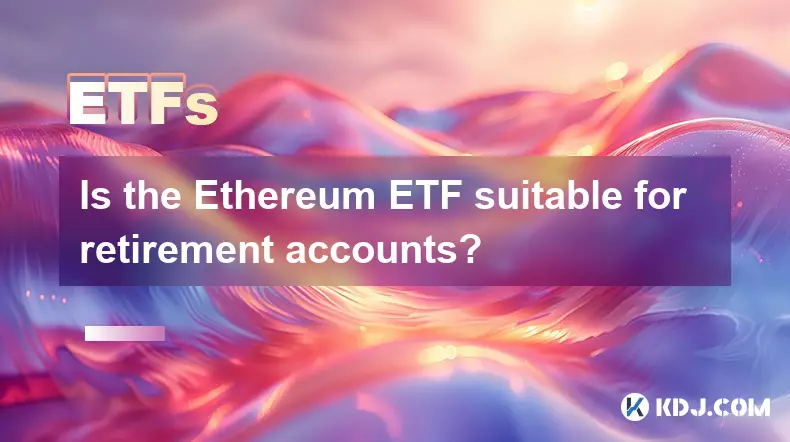
Is the Ethereum ETF suitable for retirement accounts?
Sep 29,2025 at 06:36am
Ethereum ETFs and Their Role in Retirement Planning1. Ethereum Exchange-Traded Funds (ETFs) have emerged as a bridge between traditional finance and d...
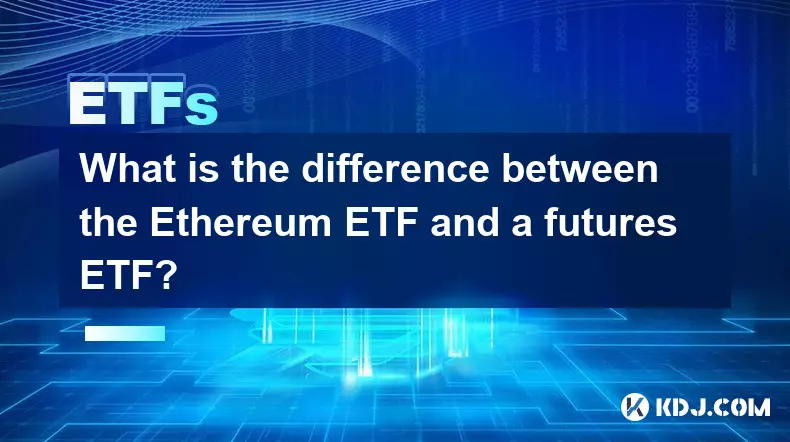
What is the difference between the Ethereum ETF and a futures ETF?
Sep 23,2025 at 06:18am
Bitcoin's Role in Decentralized Finance Evolution1. Bitcoin remains the cornerstone of decentralized finance, serving as a benchmark for value transfe...
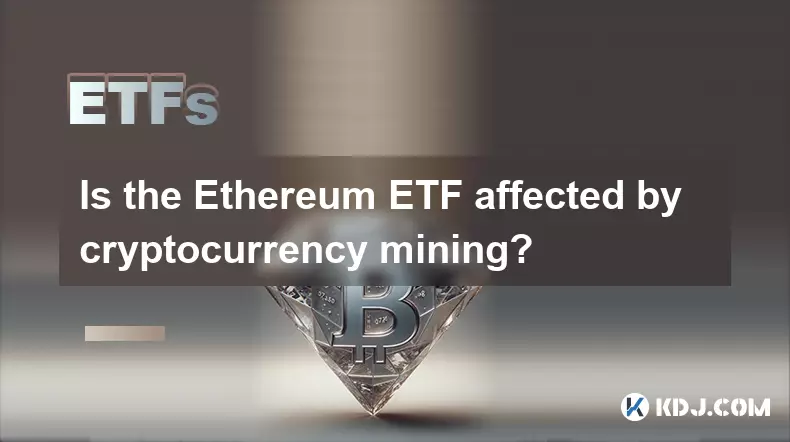
Is the Ethereum ETF affected by cryptocurrency mining?
Sep 23,2025 at 03:37pm
Understanding Ethereum ETFs and Their Market Drivers1. An Ethereum ETF (Exchange-Traded Fund) is a financial product that tracks the price of Ethereum...

Will the Ethereum ETF affect the decentralization of Ethereum?
Sep 28,2025 at 04:37am
Understanding Ethereum ETFs and Their Structure1. An Ethereum ETF (Exchange-Traded Fund) is a financial product that tracks the price of Ethereum with...

What is the future development prospect of the Ethereum ETF?
Sep 23,2025 at 01:36am
Ethereum ETF and Market Dynamics1. The introduction of an Ethereum ETF has sparked significant interest across the digital asset space. Institutional ...

Is the Ethereum ETF affected by Ethereum gas fees?
Sep 25,2025 at 12:18am
Ethereum ETFs and Their Structural Independence from Gas Fees1. Ethereum Exchange-Traded Funds (ETFs) are financial instruments designed to track the ...

Is the Ethereum ETF suitable for retirement accounts?
Sep 29,2025 at 06:36am
Ethereum ETFs and Their Role in Retirement Planning1. Ethereum Exchange-Traded Funds (ETFs) have emerged as a bridge between traditional finance and d...

What is the difference between the Ethereum ETF and a futures ETF?
Sep 23,2025 at 06:18am
Bitcoin's Role in Decentralized Finance Evolution1. Bitcoin remains the cornerstone of decentralized finance, serving as a benchmark for value transfe...

Is the Ethereum ETF affected by cryptocurrency mining?
Sep 23,2025 at 03:37pm
Understanding Ethereum ETFs and Their Market Drivers1. An Ethereum ETF (Exchange-Traded Fund) is a financial product that tracks the price of Ethereum...
See all articles










































































